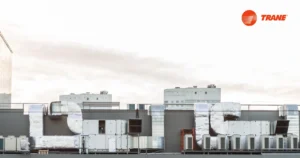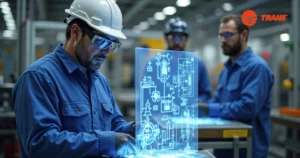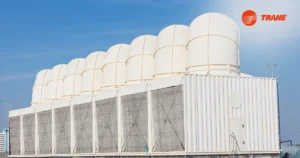Saudi Arabia’s economy is diversifying at an unprecedented pace, driven by investments in industry, infrastructure, and technology under the Vision 2030 initiative. This growth, combined with the Kingdom’s harsh climate, is creating unprecedented demand for reliable, efficient, and scalable cooling. From industrial plants to commercial towers, the air cooled chiller has emerged as a preferred solution, offering resilience, efficiency, and adaptability for the Kingdom’s modern economy.
Climate Challenges Facing Businesses
The Saudi climate is defined by intense heat, with summer temperatures routinely climbing above 45°C. For businesses, these extreme conditions present significant risks. Factories must protect machinery, raw materials, and workforce safety. Data centers require uninterrupted cooling to prevent equipment failures that could disrupt banking, government, and telecom operations. Even commercial facilities such as hospitals and malls depend on stable temperatures to ensure safety and comfort. In such an environment, cooling is not just a technical need, but a mission-critical business requirement.
Why Air Cooled Technology Fits the Region
Among available cooling technologies, the air cooled chiller stands out for its suitability to Saudi Arabia’s environment. Unlike water-cooled systems, it does not depend on abundant water resources, a key advantage in a desert climate where water conservation is essential. These systems are built for durability, capable of delivering efficient performance even in the face of fluctuating loads and extreme temperatures. For industries where reliability directly impacts revenue, this technology provides a trusted safeguard against operational risk.
Flexibility for Rapidly Expanding Sectors
As Saudi Arabia expands its industrial base, cooling needs are becoming increasingly diverse. Traditional fixed installations cannot always match the speed and flexibility required for fast-developing projects. Industries ranging from oil and gas to logistics hubs and smart city developments require scalable cooling that can be deployed quickly. Trane Saudi Arabia delivers adaptable systems that allow businesses to respond to both short-term surges and long-term strategic growth.
Unlocking Options with Rentals
Not every business is ready to invest in permanent cooling infrastructure. Seasonal demand peaks, temporary projects, or unexpected breakdowns often require immediate alternatives. In these situations, cooling rental solutions provide organizations with access to advanced systems without heavy upfront costs. Trane’s rental programs allow companies to maintain resilience and flexibility, ensuring operations continue without interruption.
Strengthening Industrial Competitiveness
Modern industries rely heavily on stable cooling to ensure product quality and reduce waste. In Saudi Arabia’s manufacturing plants, temperature control ensures efficiency across production lines. In logistics, warehouses depend on cooling to protect goods, from pharmaceuticals to food products, during storage and transport. Meanwhile, the construction sector requires climate solutions to maintain worker productivity and safeguard equipment during extreme conditions. By providing reliable, scalable systems, Trane directly contributes to national competitiveness.
Energy Efficiency and Environmental Responsibility
Vision 2030 emphasizes sustainability alongside growth. Energy-efficient solutions are essential for reducing operating costs and achieving environmental commitments. Trane’s systems integrate advanced compressors, smart controls, and eco-friendly refrigerants, ensuring high performance while minimizing environmental impact. Businesses gain the dual benefit of cost savings and alignment with the Kingdom’s sustainability agenda, which is increasingly valued by global investors and partners.
Smart Technology for Smarter Operations
Cooling in the modern era extends far beyond mechanical function. Digital monitoring tools and intelligent controls now provide real-time insights into energy consumption, system health, and performance optimization. This technology allows businesses to anticipate maintenance needs, reduce downtime, and improve overall reliability. By combining advanced hardware with data-driven management, Trane Saudi Arabia delivers solutions that align with the future of smart industry.
Case Applications Across the Kingdom
The importance of scalable cooling is reflected in real-world applications across Saudi Arabia:
- Oil and Gas Facilities: Maintain stability in energy-intensive operations, where overheating can halt production.
- Healthcare Institutions: Ensure reliable environments for patients, laboratories, and life-saving equipment.
- Commercial Towers: Provide consistent comfort for tenants and customers, supporting economic productivity.
- Technology Hubs: Protect servers and IT infrastructure, safeguarding essential digital services.
Each case illustrates how cooling solutions are central to the country’s ability to grow and compete globally.
Why Trane is the Partner of Choice
Trane’s edge lies not only in advanced equipment but also in comprehensive service. From needs assessment and system design to installation, monitoring, and support, Trane Saudi Arabia provides turnkey solutions that meet the highest global standards. Businesses are assured of reliable service backed by decades of expertise, allowing them to focus on growth rather than operational disruptions.
Closing Thought
For Saudi industries and institutions, cooling is more than an operational requirement — it is a foundation for resilience and progress. By choosing Trane Saudi Arabia, organizations gain reliable systems, expert service, and trusted long-term support. With proven solutions in chiller rental, Trane ensures that businesses are equipped to thrive in one of the world’s most demanding climates.




